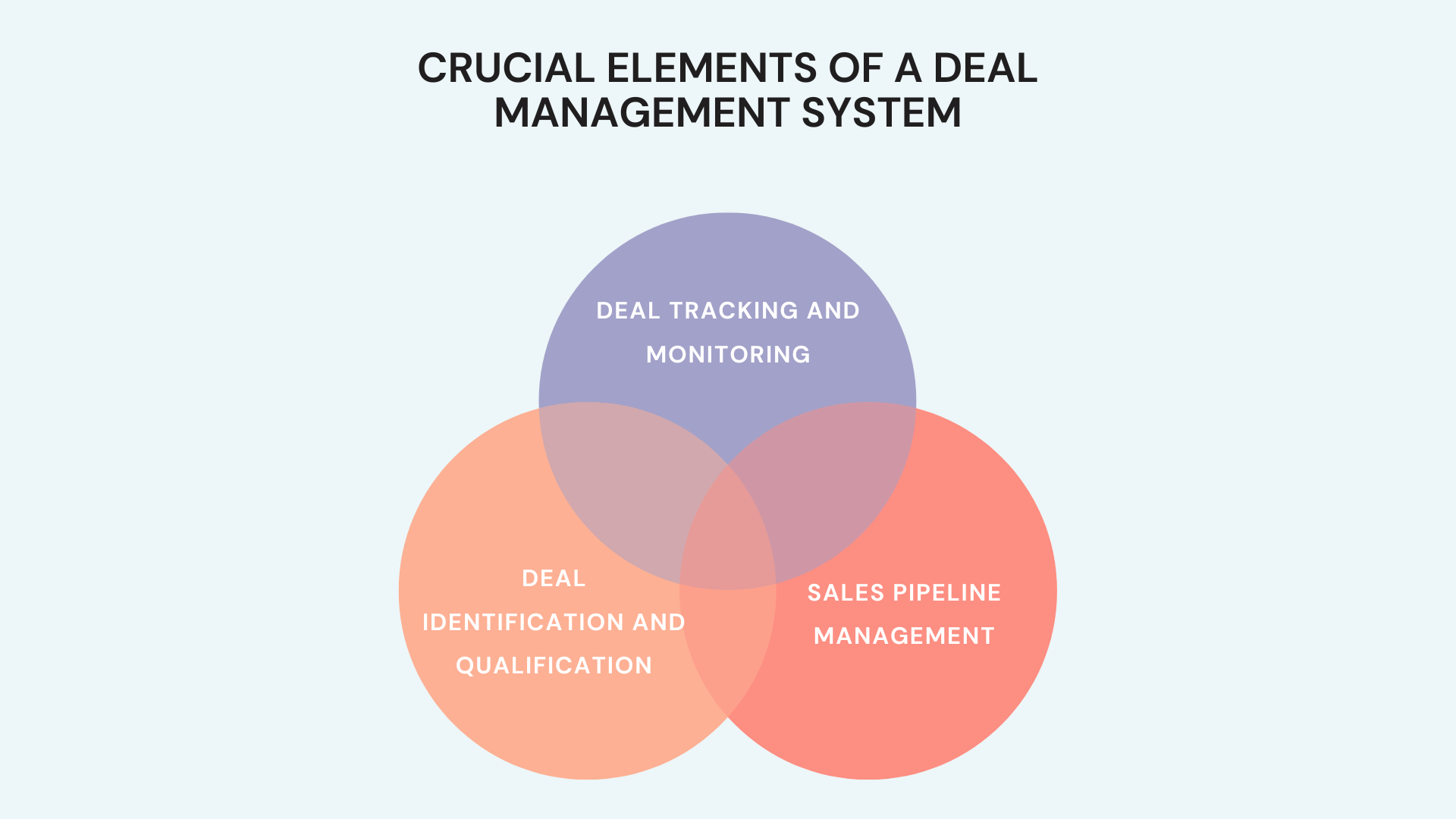
Home »
How Deal Management Software Boosts Sales
Discover how deal management software drives sales growth. Streamline processes for increased revenue.
Introduction
As businesses strive to optimize their sales processes, maintain healthy pipelines, and secure more deals, the role of technology becomes increasingly crucial. Enter Deal Management Software – a powerful tool designed to streamline, enhance, and supercharge sales operations.
This article delves into the transformative impact of Deal Management Software on sales performance and how it empowers sales teams to achieve unprecedented growth. We will explore the key functionalities and benefits that this software brings to the table, illustrating how it becomes an indispensable asset for sales professionals and organizations alike.
Overview of Deal management
Deal management is a critical process within the realm of sales and business development, focused on effectively navigating the complexities of deals and opportunities from initiation to closure. This multifaceted practice involves overseeing the entire deal lifecycle, encompassing lead generation, deal identification, qualification, and progress tracking.
By streamlining the sales process and enhancing collaboration among sales teams and other departments, deal management software plays a pivotal role in driving sales growth and revenue generation.
The software empowers businesses with real-time deal visibility, analytics, and data-driven insights, enabling informed decision-making and strategic planning. Furthermore, deal management software ensures compliance with regulatory standards and data security, safeguarding sensitive information throughout the sales journey.
What is Deal management software?
Deal management software is a specialized technological solution designed to facilitate and optimize the entire process of managing sales deals and opportunities. It serves as a centralized platform that streamlines various aspects of the sales journey, enabling businesses to efficiently track, monitor, and progress deals from their initial stages to successful closures.
At its core, deal management software provides tools and features to handle lead generation, deal identification, and qualification. It helps sales teams prioritize opportunities based on predefined criteria and ensures that resources are allocated effectively to pursue the most promising deals. Through automated workflows and notifications, the software assists in maintaining a structured and organized approach to deal progression.
One of the key advantages of deal management software is its ability to enhance collaboration and communication among different teams and stakeholders involved in the sales process. It facilitates seamless coordination between sales representatives, managers, marketing teams, finance departments, and other relevant parties, fostering a cohesive and efficient workflow.

Essential components of a Deal management system
An effective deal management system comprises several essential components that work together to streamline the sales process and ensure successful deal closures. These components provide the necessary tools and functionalities to manage deals efficiently and maximize sales performance. Here are the key components of a comprehensive deal management system:
- Deal Tracking and Monitoring: Deal tracking is the foundation of the system, allowing sales teams to record and monitor all deals throughout their lifecycle. It provides a centralized repository where sales representatives can access deal information, update progress, and view the current status of each opportunity. Deal tracking helps to prioritize deals, set milestones, and allocate resources effectively.
- Deal Identification and Qualification: This component assists sales teams in identifying potential deals and evaluating their viability. It involves lead management, lead scoring, and deal qualification criteria. By automating lead assignment and routing, sales representatives can quickly respond to incoming leads and focus on the most promising opportunities.
- Sales Pipeline Management: The sales pipeline management feature provides a visual representation of all deals at various stages of the sales process. It enables sales managers and executives to assess the overall health of the pipeline, identify potential bottlenecks, and forecast revenue based on the probability of deal closures at different stages.

Importance of streamlining Deal management processes
Streamlining deal management processes is of utmost importance for businesses looking to achieve heightened sales efficiency, improved productivity, and increased revenue. The benefits of streamlining deal management are numerous and directly impact various aspects of a company’s sales operations.
Streamlining the deal management process ensures that deals move smoothly and swiftly through various stages of the sales pipeline. By eliminating unnecessary delays, manual tasks and sales representatives can focus more on closing deals and less on administrative tasks, leading to faster deal progression.
An organized and streamlined deal management process empowers sales teams to work more efficiently. Sales representatives can access deal information, collaborate with other teams, and receive real-time updates on deal status, allowing them to prioritize their efforts and time effectively.
A streamlined deal management system provides a comprehensive view of all deals in the pipeline. Sales managers and executives can track deal progress, identify potential issues, and make informed decisions based on real-time data and analytics. Improved visibility also allows for better sales forecasting and resource allocation.
Benefits of Deal Management Software
Deal management software offers numerous benefits to businesses across various industries. These advantages revolve around streamlining the sales process, enhancing collaboration, and providing data-driven insights.
- Improved Sales Efficiency: Deal management software automates repetitive tasks, streamlines workflows, and centralizes deal-related information. This boosts sales team productivity, enabling them to focus on engaging with prospects and closing deals more efficiently.
- Enhanced Deal Visibility: With deal tracking and reporting features, the software provides real-time visibility into the status and progress of deals in the sales pipeline. Sales managers can identify potential bottlenecks, prioritize deals, and allocate resources effectively.
- Data-Driven Decision Making: Deal management software generates valuable data and analytics on deal performance, sales trends, and key performance indicators. This data empowers sales managers and executives to make informed decisions and devise effective sales strategies.
- Accelerated Sales Cycles: By automating approval processes and reducing manual interventions, deal management software speeds up the sales cycle. Sales representatives can navigate deals through various stages more quickly, leading to faster deal closures.
- Better Sales Forecasting: Deal management software provides accurate and up-to-date data, enabling more reliable sales forecasting. Sales managers can anticipate revenue streams, plan resources, and set realistic sales targets.
- Scalability and Adaptability: A robust deal management software can scale with the growth of the business and adapt to changing sales processes and requirements. It remains an essential tool even as the organization expands its operations.
Factors to consider when choosing a Deal management software solution
When choosing a deal management software solution, several critical factors should be carefully considered to ensure the software aligns with the specific needs and goals of the business. Making an informed decision requires a comprehensive evaluation of various aspects of the software’s capabilities and compatibility with the organization’s sales processes. Here are the key factors to consider:
Assess the software’s core functionalities and features, such as deal tracking, lead management, reporting, analytics, collaboration tools, and integration capabilities with CRM and ERP systems. Ensure that the software covers all essential aspects of deal management and aligns with the organization’s specific requirements.
A user-friendly interface is crucial to ensure widespread adoption and efficiency among the sales team. Test the software’s usability and navigation to ensure that it is intuitive and easy to learn for both experienced and new users.
Consider whether the software can be tailored to match the organization’s unique sales processes and business rules. Additionally, evaluate its scalability to accommodate growing sales operations and increasing deal volumes in the future.
Best practices for using Deal management software effectively
Best practices for using Deal management software effectively
To utilize deal management software effectively and maximize its benefits, businesses can follow these best practices:
- Standardize Sales Processes: Establish standardized sales processes that align with the capabilities of the deal management software. Define clear deal stages, milestones, and criteria for deal qualification to ensure consistency in deal tracking and reporting.
- Data Accuracy and Integrity: Emphasize the importance of data accuracy and integrity. Encourage sales representatives to diligently update deal information in real-time, ensuring that the system contains the most current and reliable data for reporting and decision-making.
- Embrace Collaboration: Encourage collaboration among sales teams, managers, and other departments involved in the sales process. Utilize the software’s communication and collaboration tools to facilitate seamless communication, share updates, and address any challenges collectively.
- Regular Reporting and Analysis: Set up a regular reporting schedule to review key performance indicators, deal progress, and sales trends. Use the software’s reporting and analytics capabilities to gain insights into the sales pipeline and make data-driven decisions.
- Monitor and Improve Sales Metrics: Continuously monitor sales metrics, such as conversion rates, win rates, and deal cycle times. Identify areas for improvement and implement strategies to optimize sales performance based on the data insights provided by the software.
Discussion of common challenges faced by Organizations
One of the primary challenges is a lack of visibility into the status and progress of deals. Without a centralized system to track and monitor deals, it becomes challenging for sales managers to have a real-time view of the sales pipeline, resulting in difficulty in prioritizing and allocating resources effectively.
Relying on manual processes and disparate tools for deal management can lead to inefficiencies and errors. Managing deals across spreadsheets, emails, and other tools makes it difficult to maintain data accuracy and can lead to miscommunication or overlooked tasks.
Inconsistent deal qualification criteria can lead to pursuing deals that are not a good fit for the organization. This can waste valuable time and resources and result in lost opportunities to focus on more promising prospects.
Without comprehensive reporting and analytics capabilities, organizations may lack the insights needed to identify trends, performance gaps, and areas for improvement in the sales process. Some industries deal with complex deal structures involving multiple parties, customizations, or long sales cycles. Managing such deals efficiently requires a well-structured deal management process.

How KEBS helps to address these challenges?

As an advanced Professional Services Automation (PSA) software, KEBS offers various features and capabilities that effectively address the common challenges faced by organizations in terms of deal management. Here’s how KEBS helps overcome these challenges:
- Workflow & Approval Automation: KEBS automates workflows and approval processes, eliminating procedural delays and ensuring instant and automated approvals. This streamlines business operations and increases efficiency by reducing manual intervention.
- Account 360: With the Account 360 feature, KEBS offers complete access to customer databases. This allows businesses to understand their customers better and deliver a frictionless end-user experience, improving customer satisfaction.
- Proposal Builder: KEBS includes a Proposal Builder tool that enables users to create customized proposals instantly. By generating highly effective proposal documents quickly, businesses can increase their chances of successful conversions.
- Sales Pipeline: The Sales Pipeline feature in KEBS facilitates efficient deal management, enabling businesses to close deals more effectively. It optimizes the sales process and improves lead-to-conversion ratios.
- Collaborative Forecasting: KEBS supports collaborative forecasting, allowing teams to predict sales revenue more accurately. With automated and data-driven forecasting, businesses can maximize revenue and profit margins.
- Costing Sheet: KEBS assists in managing available resources efficiently by providing a costing sheet feature. This enables businesses to recruit new associates according to their requirements, optimizing resource allocation.
- Book & Bill: The Book & Bill feature helps maintain an optimum book and bill ratio by automating data tracking. This ensures that financial data is accurately recorded, leading to better financial management.
Overall, KEBS offers a comprehensive set of features to streamline various aspects of professional services automation.
| Workflow & Approval Automation | Automates workflows and approval processes, reducing delays and ensuring automated approvals for increased efficiency. |
| Account 360 | Offers complete access to customer databases, enhancing understanding of customers and improving end-user experiences. |
| Proposal Builder | Includes a Proposal Builder tool for instant creation of customized proposals, increasing chances of successful conversions. |
| Sales Pipeline | Facilitates efficient deal management, optimizing the sales process and improving lead-to-conversion ratios. |
| Collaborative Forecasting | Supports collaborative forecasting for accurate sales revenue predictions, maximizing revenue and profit margins. |
| Costing Sheet | Assists in efficient resource allocation through a costing sheet feature, optimizing resource management. |
Conclusion
In conclusion, the adoption of deal management software emerges as a game-changing strategy for businesses aiming to boost their sales performance and drive sustainable growth.
KEBS, a cutting-edge Professional Services Automation (PSA) software, offers a comprehensive solution to the challenges faced by organizations in managing their deals. With its robust functionalities such as deal tracking, workflow automation, and collaborative forecasting, KEBS empowers sales teams to seize opportunities, maximize productivity, and close deals with class.
Streamline your quote to cash with KEBS!









